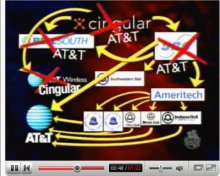Will telcos ever embrace open source?


After covering phone companies since before the 1984 Bell break-up, I come away convinced that, even if they become open source customers, telcos will never embrace open source values.
This may, in fact, be one of the simplest and best arguments for breaking them up again. (A great TV moment, Stephen Colbert explaining how AT&T got back together.)
Companies like CIMI talk a good game about helping telcos become more profitable with open source, but it will never work. The corporate graveyard is filled with companies who bought Bell promises of change and died waiting to take advantage of it.
The Internet itself grew up in defiance of the telcos. Its business model is anathema to them. Thus telcos and cable operators do all they can to undermine the Internet, running proprietary wireless networks and seeking to wall-off online access to shows.
They claim to be slowing progress on behalf of rights holders but they are really acting in their self-interest. They can't survive as mere "bit pushers."
So they shouldn't. Companies that build on Internet resources understand that open source creates rapid innovation, and that you can't let a bureaucracy get in its way. Phone companies will never accept this.
So they should go away. Sell the wire on and turn the infrastructure into IP-only. Given how well VOIP works, it should be less disruptive than the current digital TV switchover.
Non-Bell owners of the wires would gladly wholesale their capacity, not just retail it, because they would be looking to make money, not maintain control of the customer. They would use open source to innovate and cut costs, without having to run everything past a committee.
Monopolies never innovate. It's just that simple.
The fastest way to encourage innovation in the telco space is not to subsidize existing providers. It's to provide competition. It's to break up the monopolists and leave everyone so small they will be hungry for business, anxious to cut costs, and ready to embrace the open source method.